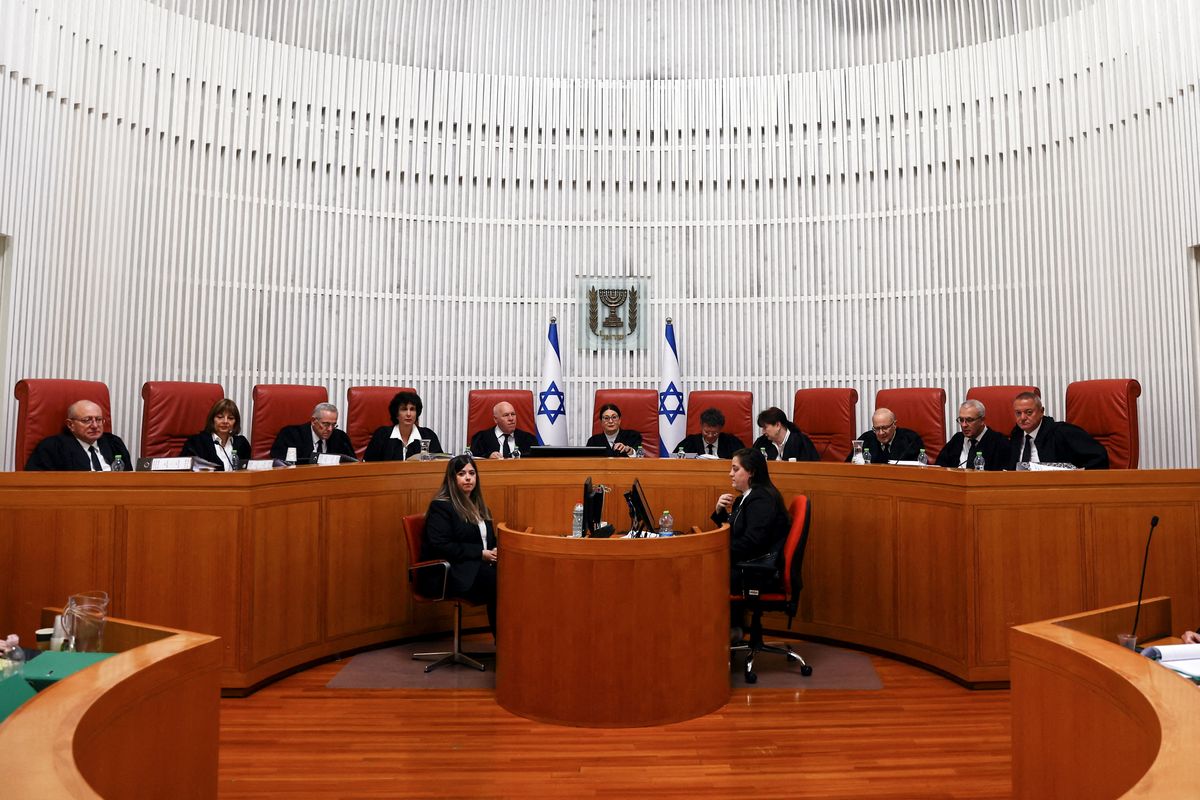Israel Supreme Court hears challenges to judicial overhaul
Since he came back into office as prime minister of Israel last December, Benjamin Netanyahu has been trying to get new reforms to the judicial branch of government off the ground.

A few minutes every morning is all you need.
Stay up to date on the world's Headlines and Human Stories. It's fun, it's factual, it's fluff-free.
The backstory: Since he came back into office as prime minister of Israel last December, Benjamin Netanyahu has been trying to get new reforms to the judicial branch of government off the ground. These new policies would effectively weaken Israel’s courts and make the legislative and executive branches more powerful. Ever since these proposed changes were announced, there have been mass protests from Israelis nationwide, especially in Tel Aviv. Many citizens are worried about how this judicial overhaul could affect their human rights. Some are also concerned about how it could impact Palestinians. There’s been international criticism, too, including from the US, a major ally of Israel.
More recently: On July 24, the first part of the judicial overhaul went through, with the Knesset voting to pass it. This vote approved an amendment to the Basic Laws – which is kind of like Israel’s constitution – that would squash the Supreme Court's power to overrule government decisions that it finds "unreasonable.” But the protests are still expected to continue. One large group of protesters is the Brothers and Sisters in Arms, which is made up of thousands of Israel Defense Forces (IDF) reservists who say they won’t show up to train if this overhaul goes into effect. There are other policies that are involved in the overhaul, like one that would give the ruling coalition control over judge appointments, that haven’t been voted on yet.
The development: On Thursday, Israel’s Supreme Court heard a challenge to a law passed in March that limits removing the prime minister from office to only in cases of physical or mental incapacitation. Before that, the leader could be removed in exceptional circumstances, for example, if they were charged with a crime. So, some are saying this law is an attempt to protect Netanyahu from being challenged as “unfit” for office because of his ongoing corruption trial.
The petitioners – the Movement for Quality Government in Israel and the Yisrael Beiteinu party – argued that because Netanyahu is currently involved in this corruption trial, there’s a conflict of interest when it comes to his position. So, the Supreme Court is trying to decide whether or not this law can protect him from getting the boot for that reason and whether or not it should really even be a law at all.
With everything else going on with the Israeli government, the Movement is accusing the government of trying to weaken the judiciary to protect Netanyahu. During the hearings, protesters against these new laws gathered outside of the High Court building. If the court overturns the law, that means that Netanyahu will be vulnerable to being removed from office.
Key comments:
"The judicial overhaul has four pillars and each of them is taking a bite out of our Supreme Court, and out of us as women," activist Moran Zer Katzenstein said. "We can't allow this. Every time women's rights — or other things in the public sphere — were harmed by the government, the Supreme Court stood by our side and on the side of minorities."
“The Knesset interfered in the Israeli constitution, changing it only for one person,” Tomer Naor, chief legal officer of the Movement for Quality Government in Israel, said outside the court.
“It’s so ironic that they’re talking and protesting for democracy while at the same time, it’s been a dictatorship for Palestinians for 75 years,” said Diana Buttu, a Palestinian commentator. “They’re afraid that their own privileges and rights are going to somehow be affected, but they won’t make the connection [to the occupation].”
"We don't need to respect the court's decision just like it doesn't respect Knesset's decisions," Jerusalem Affairs and Heritage Minister Amichai Eliyahu said to Israeli media.




Comments ()